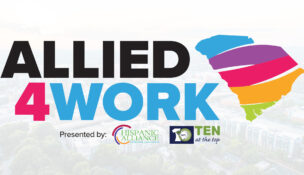Rapid Shelter Columbia marks one year – see inside the community
Jason Thomas //November 3, 2023//

Columbia officials are marking the one-year anniversary of the Rapid Shelter Columbia program.
When it launched a year ago, Rapid Shelter Columbia was the first community of its kind in the Southeast, according to a news release. The idea was simple: Give people the transitional shelter, support, and sense of security they need to recover and reset their lives.
"At the end of the day, getting people into temporary housing allows us the opportunity to connect them with the resources they need,” said Mayor Daniel Rickenmann in the release. “Rapid Shelter Columbia has given us a touchpoint for wraparound services to transition individuals into permanent housing and have the opportunity to live the life they deserve.”
Rapid Shelter Columbia is a cluster of 50 pallet units whereby residents get their own private space, bed, and storage, the release stated. Just 64 square feet, these pallets are built for maximum efficiency, enabling the City of Columbia to help as many people as possible.
The proof is in the numbers
As of October 2023, Rapid Shelter had received 504 referrals from the City of Columbia Police Department, Richland County Public Library, other agencies, and community organizations, the release stated. Of those, 188 people qualified for admission into Rapid Shelter Columbia.
Related content: Rapid Shelter Columbia on track to open soon
Residents go through a screening process to determine whether they meet the qualifications for being chronically unsheltered, as defined by being homeless for a consecutive year or four separate times in three years.
Around 50% were diagnosed for mental health issues, and another 35% for substance abuse disorder. Thirty-two percent had a physical disability, and 28% a chronic health condition.
Homelessness on the rise
Nationally, homelessness has been on the rise since 2017, up 6% overall, according to the release. Cities with high housing costs top the list for likelihood of homelessness. By comparison, South Carolina — and the state capital Columbia in particular — remain much more affordable.
In South Carolina, approximately 4,287 people were homeless in 2002, which is about eight for every 10,000 people, according to the release. This places South Carolina low on the list of states with high homelessness, 11th overall. According to the U.S. Department of Housing and Urban Development, Columbia/Midlands saw a 64% decrease in its unsheltered population between 2007 and 2022. Despite these statistics, City of Columbia officials acknowledged and were determined to focus on a growing population of the chronically unsheltered in the City.
A short-term fix with long-term gains
Rapid Shelter Columbia extends far beyond the walls of each pallet unit, the release stated. Residents receive personalized job and housing assistance through the City of Columbia’s team of specially trained case managers. Food and access to medical and mental health services are also available through a network of recovery and healthcare partners. Laundry, showers, and grooming supplies give residents a fresh start on their new path in life.
“People are at the heart of our community,” said Mackin Wall, project manager, in the release. “Rapid Shelter Columbia depends on a network of qualified and compassionate partners to help get residents the specialized assistance they need, whether it is grief or recovery counseling, medical care, or mental health support, in addition to things like finding a job, learning new skills, or accessing documentation.”
MIRCI assists vulnerable adults who need immediate and continuing life assistance due to mental illness, specifically those experiencing homelessness and those at-risk of homelessness. MIRCI’s clinical and support programs help people build healthy and independent lives. In addition, MIRCI provides permanent, supportive, subsidized housing.
LRADAC, The Lexington/Richland Alcohol and Drug Abuse Council, is a non-profit agency that offers a wide array of prevention, intervention, and treatment programs to fight addiction and drug misuse.
Prisma Health’s Program of All-Inclusive Care for the Elderly (PACE) provides all-inclusive care for the elderly in Richland and Lexington counties. It focuses on both chronic care needs and preventative care.
“As it turns out, the small safe space was exactly what residents needed to feel a sense of ownership, helping them transition to permanent housing,” said City Manager Teresa Wilson in the release. “This remains our ultimate goal.”
T














